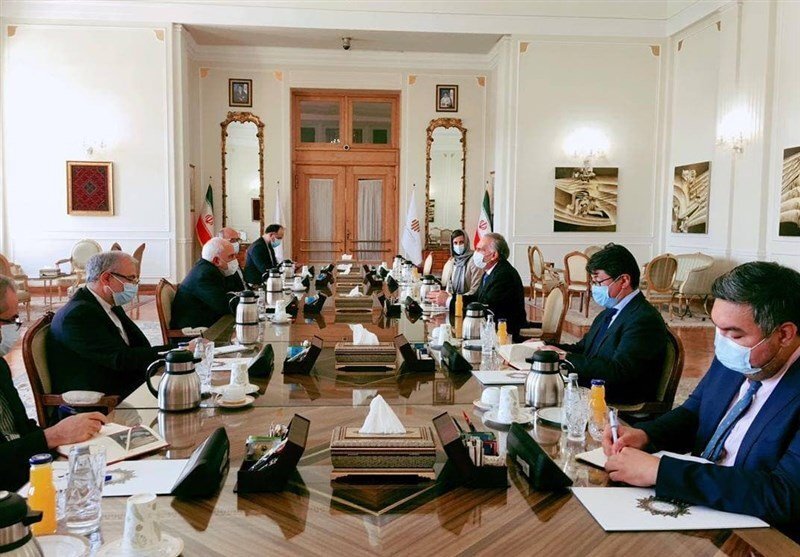Zarif says had ‘fruitful’ talks with UN envoys on Yemen, Afghanistan

TEHRAN- Iranian Foreign Minister Mohammad Javad Zarif has described his meetings with two UN envoys on Yemen and Afghanistan as fruitful and expressed Iran’s readiness to facilitate peace efforts in the two war-torn countries.
Zarif met on Tuesday with UN Secretary-General's Personal Envoy on Afghanistan Jean Arnault and Martin Griffiths, the UN special envoy for Yemen. He discussed with the two UN officials the latest developments in Afghanistan and Yemen.
“Fruitful talks with UNSG SRs on Afghanistan, Mr. Arnault, and on Yemen, Mr. Griffiths. Key theme: Peace processes must be owned by all Afghans and Yemenis—without external imposition. Important common denominator: Iran seeks regional peace and stability. Ready to facilitate,” the Iranian foreign minister said on Twitter.
Griffiths held talks with Zarif on various aspects of the Yemen crisis and the ways to achieve peace and stability in the country according to a statement issued by the Iranian Foreign Ministry.
In the Tuesday meeting, the Iranian foreign minister elaborated on Iran's viewpoint on ending the Yemen crisis, the developments following the beginning of the crisis in the country, and underlined the need for removing the blockade against the country and facilitating the delivery of humanitarian aid to the Yemeni people.
Foreign Minister Zarif expounded on Iran's principled policy that war is not a solution to the Yemen crisis, and said the current disastrous situation in Yemen - which has put the Yemeni people on the verge of a humanitarian disaster after six years - can only be wound up through political talks and peaceful ways.
The UN envoy, in turn, briefed the Iranian chief diplomat on the results of his negotiations with relevant bodies on the Yemen crisis.
Griffiths, who will soon be appointed as UN undersecretary general for humanitarian affairs, also met with Iranian Deputy Foreign Minister for Legal and International Affairs Mohsen Baharvand.
In the meeting, Baharvand congratulated Griffiths on his new post, and stressed the importance of the United Nations’ humanitarian aid in conflict zones, especially in Yemen, Syria, Afghanistan and Iraq regardless of political considerations and pressure.
Despite cruel sanctions, he said, Iran has always stood ready to help the UN expedite the trend of sending humanitarian aid to the needy in war-hit areas.
“Unfortunately, the United States’ unilateral sanctions have not only impeded trade in humanitarian goods such as buying food and drugs, but also overshadowed the UN’s dispatching of humanitarian aid to the needy in conflict-stricken and crisis-hit zones,” the senior Iranian diplomat explained.
“As soon as Griffiths assumes his new responsibility, he should put this issue on the agenda,” he added.
Baharvand proposed that an international contract be drawn up under which humanitarian assistance and trade cannot be targeted by sanctions and political considerations or be used for military purposes.
The Iranian official also expressed deep concern over a rise in terrorist attacks in Afghanistan against specific ethnic groups and religions, especially girls’ schools.
He said such acts not only amount to war crimes, but are also regarded as a gross violation of human rights.
The diplomat called on international organizations to pay attention to this issue.
Griffiths, in turn, underlined that he would soon begin work in his new capacity, elaborating on the priorities of the United Nations’ humanitarian programs.
The two sides also exchanged views on regional issues, including the developments pertaining to Yemen, Syria, Afghanistan and Iraq as well as the UN’s role from a humanitarian perspective.
Foreign Minister Zarif also held separate talks with Arnault on the latest developments in Afghanistan. In the meeting, Zarif elaborated on Iran's viewpoint regarding Afghanistan, especially peace and security in the country and the peace process led by Afghans.
He also expressed Tehran's support for intra-Afghan talks and the need to protect the achievements of the Afghan people in recent years, especially in terms of the basic rights of the people.
Jean Arnault, in turn, highlighted the key role of neighbors and the fact that he has started his regional tour from Iran after being appointed to this position.
He also noted that the issue of Afghanistan can be resolved through collective measures, and his efforts are focused on finding a way for realizing this collective cooperation.
The meeting took place in continuation of Iran’s diplomatic efforts to achieve peace and security in neighboring Afghanistan.
Iran’s special envoy for Afghanistan Mohammad Ebrahim Taherian held a phone conversation with Afghanistan’s National Security Advisor Hamdullah Mohib regarding the recent developments in Afghanistan.
During the conversation, the Iranian official touched upon a trip to Iran by the UN’s special envoy for Afghanistan, and underscored the need to adopt a common stance by different Afghan factions with regards to the peace process in the country.
Mohib, in turn, appreciated the stances adopted by Iran on the peace trend in his country, and said Kabul would not accept solutions that are based on non-peaceful means.
He also emphasized the need to stand up to the fresh wave of violence in Afghanistan.
Earlier, he held phone talks with Abdullah Abdullah, the head of Afghanistan's High Council for National Reconciliation (HCNR), on the country's developments and the visit to Tehran of the UN Secretary General's personal envoy on Afghanistan.
In the Tuesday phone call, Abdullah called for continued support for the country's peace process.
Taherian, in turn, underlined Iran's support for the Afghan peace process and efforts made within this framework.
He also stressed the necessity for further interaction among various fronts of the country in order to accelerate the achievement of peace.
Leave a Comment